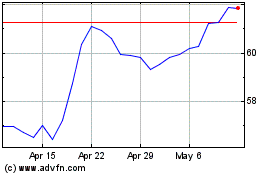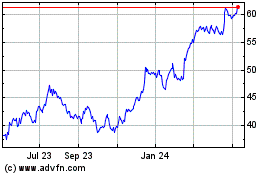Regulator Deadline Has Wells Scurrying -- WSJ
April 23 2018 - 3:02AM
Dow Jones News
By Emily Glazer
This article is being republished as part of our daily
reproduction of WSJ.com articles that also appeared in the U.S.
print edition of The Wall Street Journal (April 23, 2018).
Wells Fargo & Co. is facing more challenges with one of its
regulators.
The bank late last week agreed to a $1 billion settlement with
the Office of the Comptroller of the Currency and Consumer
Financial Protection Bureau related to its risk management in
consumer-lending businesses. Meanwhile, it is planning to ask the
OCC for an extension of a deadline to satisfy an enforcement action
related to anti-money-laundering controls, according to people
familiar with the matter.
Wells Fargo's wholesale business, which works with larger
corporate customers, has been having problems for months satisfying
a November 2015 consent order from the OCC. The issues relate to
processes involving new and existing corporate customers, such as
how the bank ensures there are proper identification documents and
that it has the ability to see client activities across a common
database, the people familiar with the matter said.
If Wells Fargo misses a June 30 deadline from the OCC to satisfy
that order's requirements, it could result in another enforcement
action against the bank, these people said. The bank in recent
months has been discussing the issues with the OCC, the people
said.
The struggles with the OCC enforcement action occur at a
troubling time for Wells Fargo. Besides last week's $1 billion
settlement, which forced the bank to adjust recently reported
first-quarter earnings by $800 million, Wells Fargo in February was
hit with an unprecedented enforcement action from the Federal
Reserve for failing to have proper risk controls. That order barred
the bank from growing past the $1.95 trillion in assets it had at
the end of 2017.
Much of the bank's risk-management problems have related to its
consumer-lending unit, which focuses on auto-lending and mortgages,
among other services.
The latest anti-money-laundering problems Wells Fargo is
contending with are also related to its controls. There are two
main components of anti-money-laundering processes: One is knowing
who the customer is, and the other is monitoring for suspicious
activity. Wells Fargo is struggling with the former.
In the years before the OCC's anti-money-laundering enforcement
action, it gave Wells Fargo several notices of deficiencies in
these areas known as Matters Requiring Attention. Part of the
reason for the enforcement action was the bank's failure to address
the issues the OCC had raised, the people familiar with the matter
said.
At the time of the 2015 action, Wells Fargo had more than
100,000 customer accounts it needed to verify with thousands
requiring more specific work, the people said. Over the past year
or so, Wells Fargo has reached out to thousands of clients
requesting updated documentation. It needs those documents to keep
those clients.
In particular, the bank's business-banking division that serves
small firms with annual sales ranging from $5 million to $20
million has been struggling for months to collect certain
documentation related to proof of beneficial ownership. The effort
has become even more challenging since another financial regulator
-- the Treasury Department's Financial Crimes Enforcement Network
-- will implement more stringent rules around beneficial ownership
starting in May 2018 that the bank plans to comply with, the people
said.
Earlier this year, wholesale unit head Perry Pelos stepped up
efforts on the issue, hosting town halls with employees in a bid to
get front-office bankers more involved, the people said. In
particular, the bank is requiring that the activities of high-risk
customers are covered in relationship memos, summarizing the
relationship and anti-money-laundering risk for those customers,
they said.
The OCC has levied other settlements with big banks related to
anti-money laundering in recent months.
In February, U.S. Bancorp agreed to pay $613 million in
penalties for what regulators and prosecutors described as shoddy
anti-money-laundering controls. The bank's anti-money-laundering
program was the focus of a 2015 consent order from the OCC.
Akin to Wells Fargo's current situation, Citigroup Inc. in
January entered into a $70 million settlement with the OCC for
failing to comply with a 2012 consent order related to
anti-money-laundering deficiencies.
Write to Emily Glazer at emily.glazer@wsj.com
(END) Dow Jones Newswires
April 23, 2018 02:47 ET (06:47 GMT)
Copyright (c) 2018 Dow Jones & Company, Inc.
Wells Fargo (NYSE:WFC)
Historical Stock Chart
From Mar 2024 to Apr 2024

Wells Fargo (NYSE:WFC)
Historical Stock Chart
From Apr 2023 to Apr 2024
